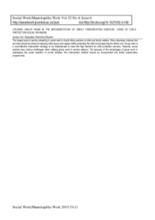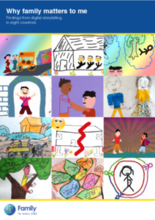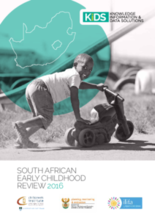childrens_living_arrangement
children_living_without_bio
Displaying 241 - 250 of 336
This study used cross-sectional data from 1848 South African children aged 9–13 to address three questions: whether CBOs are reaching those who are most vulnerable, whether attending these organizations is associated with greater psychosocial wellbeing, and how they might work.
Community-based organizations (CBOs) have the potential to provide high quality services for orphaned and vulnerable children in resource-limited settings.
This paper discusses the style and efficacy of child preservation services for the purpose of reducing child abuse and neglect.
This report examines what family means to children and adults in the following countries: Brazil, India, Guyana, South Africa, Egypt, Mexico, Russia, Kenya. The storytellers use evidence from 59 short films made using digital storytelling technique.
This study reported that unaccompanied refugee children face greater challenges compared to their accompanied refugee counterparts.
This paper highlights the difficulties faced by foreign minors and how the gaps in law leave them undocumented, vulnerable and unable to access social services. This paper also discusses how South Africa’s approach to accompanied and unaccompanied foreign minor children provides no durable long term solutions for these children, effectively leaving them in a legal hole once they reach the age of majority.
This booklet is based on a recent internal desk review of Save the Children’s and partners’ work against physical and humiliating punishment of children, commissioned by Save the Children Sweden. It aims to present best practices, to show what methods have worked around the world, and to spread knowledge about results achieved and lessons learned when it comes to law reform and positive discipline.
This report reviews South Africa’s National Integrated Early Childhood Development Policy, which was approved by the Cabinet in December 2015. The policy is aimed at providing a framework for multi-sectoral Early Childhood Development services in South Africa.
A 20-year-old woman in South Africa has pleaded guilty to trying sell her child for 5,000 rand ($380) on advertising website Gumtree. The mother faced charges including human trafficking and money laundering, and the 19-month-old boy is now i
The SVRI Forum 2015 is the ‘go to’ event in the field, bringing together over 250 researchers, activists, funders, policy makers, service providers, practitioners and survivors from around the world who are working to understand, prevent and respond to sexual and intimate partner violence.






